Menstruation is an important biological change which makes the existence of life possible, yet the culture of silence around menstruation is so complete that most of the girls have no knowledge on menstruation before their first period. The social stigma and societal silence has a negative impact on the health, reinforces gender inequality and makes it difficult to address menstrual health issues. Through the Maasika Mahotsov, 21 to 28 May 2019 we aim to break the silence around periods and get conversing at various platforms. Maasika Mahotsav 3rd edition is being observed in 9 states in India and Nepal. Darjeeling and Kalimpong will have open conversations in cafes, educational institutions, well-being centres with a public pop up stall in Darjeeling on 28 May – World Menstrual Health Day.
The need for Maasika Mahotsav is evident in that most girls and women still associate menstrual blood as dirty and impure that the body flushes out every month. They also face difficulty in performing their daily activities due to cramps, pain and tiredness during period. In addition, taboos and superstitions are still prevalent which restrict menstruating women and girls from participating in religious and cultural activities at home and in society. Some of the examples from the Darjeeling and Sikkim Himalaya, being women and girls do not touch pickles and flowers with the belief that flowers or pickles rot when touched by a menstruating lady as she is impure during those times. These societal taboos have to be broken with open conversations.
The physical and emotional changes that occur during puberty give rises to variety of social and emotional changes, so a child experience many new and unfamiliar set of social experience which is still not openly discussed in our society. Around 40 percent of women report moderate to severe premenstrual stress in the three to four days before their period. These symptoms results from a combination of hormonal changes and life stress.
Women who acknowledge premenstrual change and engage in self care are most likely to experience less stress. Thus, support from families, friends and society at large can play a vital role in helping girls and women reduce symptoms of premenstrual stress which begins with open conversations around menstruation at home and work place, , like the Maasika Mahotsav. The focus should be on helping girls and women understand her body, understand the origins of her symptoms and develop coping strategies. These might include taking time for self-care, avoiding conflict, expressing needs for support and reducing stress.
Within educational institutions, menstruation is not mainstreamed as yet. A gender equitable and menstruation sensitive educational environment is important for student engagement in education. Social taboos prove to be a hindrance for participation in various activities at school. This affects the mental and emotional health of the girls as they are already going through a lot of stress due to the physical and emotional changes.
As per the report published in 2014 by Dasra Foundation (Mumbai based organization), it is estimated that in India, 63 million adolescent girls live in homes without toilet facilities, 23 percent of adolescent girls drop out of school every year and there was 70 percent increase of reproductive tract infection owing to poor menstrual hygiene. Darjeeling Prerna’s work on menstrual health in the past two years and our interaction with teachers and students in rural Darjeeling have shown that adolescent girls miss their classes due to non availability of water, sanitation and hygiene facilities in schools during their periods. They do not have a private and safe place for changing their sanitary pads and no proper disposal facility.
This contributes to absenteeism and even dropping out of school. Menstrual health knowledge being poor results in girls not remembering their period cycle dates hence having to go home as they might not have not come prepared with the menstrual products. Thus the need to mainstream menstrual health in education as well as provide safe and hygienic infrastructure in institutions.
Menstrual health products and their untold stories
Off late, there are many sanitary products available in the market as well as promoted in popular media. The most commonly used and known among them are commercial sanitary napkins and tampons. The invention of disposables pads has certainly made the lives of many women easier and comfortable but how many of us are unaware of the harmful effects of using them over a period of time?
Commercial sanitary pads and tampons are made of 90 percent plastic which poses a serious threat to our environment and health. They are made up of bleached wood pulp(using chlorine) and super absorbent polymers gel. Dioxins and furans, some of the most deadly compound known, are the by-products of the bleaching process that makes the wood pulp white. Dioxins have serious detrimental effects on health and environment as they have the strange property of entering in to it. The SAP (gel base) absorbs the natural vaginal fluids which lead to rashes and vaginal infections. Tampons can react with bacteria in your body to create the ideal environment for bacteria to flourish, triggering potentially fatal toxic shock syndrome (TSS).
What is equally worrying is the serious threat to environment from the non-degradable sanitary napkin. The wood pulp absorbent core of the sanitary napkin is biodegradable, but it is sealed between a layer of plastic polymer at the bottom and a non-woven fabric at the top, both non-biodegradables. The super absorbent polymer (SAP) gel is also sealed within the absorbent core and its basic purpose is to super absorb, but that is also non-biodegradable. So though the absorbent core is biodegradable, all other parts make it otherwise.
There is also no mechanism to separate the biodegradable and non-biodegradable parts and in the existing solid waste management that has no segregation at source, no labeling or covering of sanitary pads and all of the unsegregated waste being rolled down the hill and many a times, burning of waste result in environmental ill health and affect our well being. Incinerators for sanitary pads are being promoted but in most instances, burn at low temperatures and produce toxic ash and emissions that are harmful to us. If plastic polymers are not burned above 800 degrees Celsius they release asphyxiates and irritant gases into the air.
Long-term exposure to these emissions or resulting ash may adversely impact the immune, nervous, endocrine and reproductive systems. There is also the issue of the dignity of the waste handler who is in touch with sanitary pads on a regular basis making them vulnerable to infectious diseases and illnesses. The disposal of commercial sanitary pads is a serious concern as it estimated that a woman produces 125 kgs of non biodegradable sanitary waste in her menstruating lifetime. These plastic sanitary pads are not bio- degradable, they occupy landfills, clog sewers and waterways and when incinerated releases harmful dioxins and unpleasant chemicals into the air we breathe.
Switching over to more Sustainable and healthier options
There is a silent revolution going on in the sustainable menstrual health discourse with increasing shift to a diversity of options.
Reusable cloth sanitary pads
Cloth sanitary napkins are much healthier as it does not contain the harmful chemicals of commercial sanitary pads. Cloth sanitary napkins are eco-friendly, health beneficial and cost convenient. They are also comfortable without itching and rashes that result with commercial pads and also do not have nauseating, artificial fragrances.
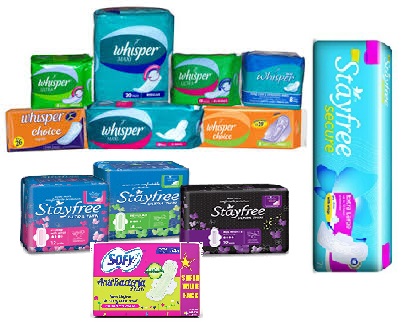
If reusable cloth pads are properly cared for, they can last up to a period of 5 years which dramatically reduce the monthly expense of buying disposables. It is environment friendly and one does not produce waste every month. While reusable cloth pads are definitely a better,healthier and sustainable option one has to adopt some of these important hygiene practices.
Are cloth pads hygienic?
When cloth pads are washed well, dried well (preferable in direct sunlight) and stored properly, they are perfectly hygienic. It is inadequate washing, drying in closed spaces and storage that makes the use of cloth unhygienic.
How do I carry used/ soiled menstrual cloth pad?
If you are out for a long day at work or school and are unable to wash the pad after use, you can fold the pad and keep it in a wet bag or leak proof travel pouches that are specially designed for this purpose.
Menstrual cups
They are reusable menstrual hygiene product made from medical grade silicone or rubber. They are flexible and funnel-shaped which is inserted into the vagina. They collect blood rather than absorbing it. Cups can hold more blood than other products and depending on one’s flow and you can wear a menstrual cup for up to 12 hours. They are one of the sustainable options available which can last for a period of 10 years. You may feel certain discomfort in the initial days in inserting the cup but with a couple of practice, it becomes easier and comfortable. Sterilizing should not be a problem as it can be done just once a month before you start using them. You can keep a separate utensil for boiling the cup so that you can use the same utensil every month for sterilizing purpose.
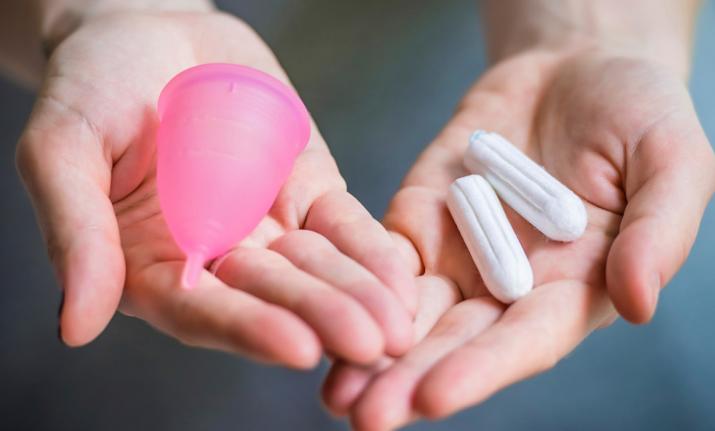
Menstrual cups and cloth sanitary pads are not readily available in the market at present but you can choose the variety of them from online sites like ecofemme.
One can make these cloth pads oneself too, just check online resources that show you how to make cloth pads at home.
With an aim to break taboos and help girls and women discuss more openly about menstruation, DLR Prerna and Zero Waste Himalaya calls on you to celebrate menstruation in Darjeeling and Sikkim with a period festival- “Maasika Mahotsav” for one week starting from 21st May and culminating on 28th May which is on World’s Menstrual Hygiene Day. The first Maasika Mahotsav was held in the year 2017 by an organisation MUSE based in Mumbai through a campaign called Period of Sharing. Like the year 2018, this year too we intend on holding awareness sessions, talks and discussions in cafes, institutions and hold public stalls displaying sustainable menstrual products with education.
Through Maasika Mahotsav, we can help achieve a taboo-free society by involving men in the conversation and help women and girls achieve good menstruation health and hygiene practices by making a choice that is more sustainable.
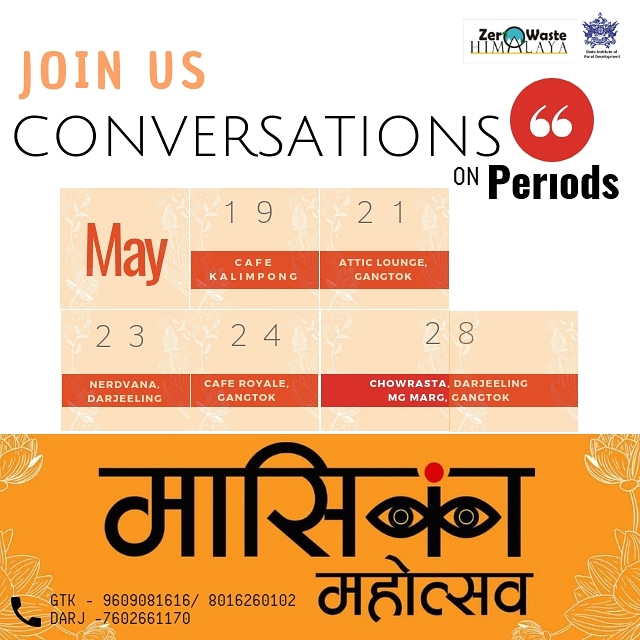
Writes: Swastika Thapa – Swastika leads the sustainable menstrual health programme in Darjeeling Prerna as well as being part of the Zero Waste Himalaya. She can be reached vial email on swastikachaiproject@gmail.com or the Darjeeling Prerna Facebook Page.

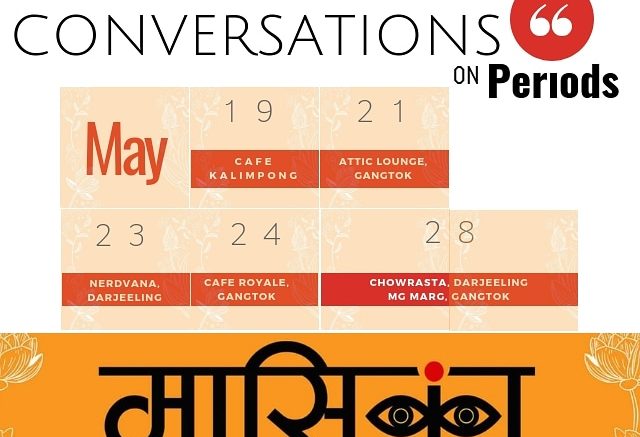
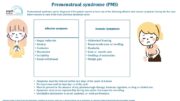



Leave a comment